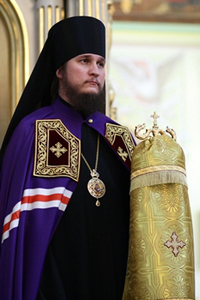Prayer is when the soul turns freely towards God. How can this freedom be reconciled with an obligation to read a rule, especially when you do not want to do it?
Freedom does not mean that everything is permitted. Man is so constituted that if he lets himself grow feeble, it is very hard to return to where he was before. In the Lives of the Saints there are lots of examples when ascetics left off their prayer rule in order to show love to newly arrived monks. In this way they put the commandment of love above their prayer rule. But we should remember that these people had attained unusual heights of spiritual life, they were in a state of unceasing prayer. However, when we feel that we do not want to pray, this is just an ordinary temptation, not an act of love.
A prayer rule supports us in a spiritually developed state, which should not depend on some passing mood. If people abandon their prayer rule, they grow feeble very quickly.
Apart from this, we should also remember that when people turn to God in communion, the enemy of our salvation always does his best to come between them. And not to let our enemy do this is not an infringement of our freedom.
When exactly should we read our morning and evening prayer rule?
This is clearly indicated in any Orthodox prayerbook. ‘Having risen from sleep, before anything else, stand reverently in front of the God Who sees all things and, making the sign of the Cross, say…’. Apart from this, the sense of the prayers themselves indicate to us that morning prayers are to be read at the start of the day, when our minds are not yet preoccupied with any other thoughts. As regards evening prayers, these should be read before sleep, after everything else. These prayers compare sleep to death and our bed to our death-bed. It would be strange indeed, having spoken about death, to go and watch TV or chat to our family.
Any prayer rule is based on the experience of the Church which we should heed. These rules do not infringe human freedom, but help us obtain a maximum of spiritual benefit. Of course, there can be exceptions to any rule, these are founded on some unforeseen circumstance.
Apart from morning and evening prayers, what else can laypeople include in their personal prayers?
Laypeople’s prayer rules can include quite a variety of prayers and rites. There can be various canons, akathists, readings from the Holy Scriptures or the Psalter, bows and genuflections, the Jesus Prayer. As well as this, these prayers should include a short or else more detailed commemoration of those who are close to us, both living and departed. In monastic practice there is a custom of including readings from the Holy Fathers in your rule. But before adding anything to your prayer rule, you need to have a good think, get advice from a priest and assess your strength. After all, a prayer rule is to be read regardless of your mood, tiredness and other movements of the heart. If you have promised God something, then you really have to fulfil out. The Holy Fathers say: Even if a rule is short, let it at least be constant. And at the same time we must pray from the heart.
Can we start adding canons and akathists to our prayer rules, of our own accord, without a blessing?
Of course, you can. But if you have not just added a prayer because your heart has prompted you to, but have permanently added it to your prayer rule, then it is better to ask for a blessing from your spiritual father. Looking objectively at the situation, a priest will assess it correctly: will this addition be for the benefit of the person concerned? If you go to confession regularly and have an inner life, then such a change in your rule will in one way or another be reflected in your spiritual life.
But this is only possible if you have a spiritual father. If there is not one and you have decided to add something to your rule, then it is still better to get advice at your next confession.
On days when the service lasts all night and we do not sleep, do we still have to read our evening and morning prayers?
Morning and evening prayers are not tied down to some specific time. But it would still be wrong to read our evening prayers in the morning and our morning prayers in the evening. We should not have a pharisaical attitude to our rule and read it whatever the situation, ignoring the sense of the words of the prayers. If we are not going to sleep, then why ask God’s blessing for sleep? Morning or evening prayers can be replaced by other prayers or by reading the Gospel.
Can women read their prayers at home with their heads uncovered?
I think it is better if women do their prayer rules with their heads covered. This cultivates a sense of humility and shows obedience to the Church. From the Holy Scriptures we know that women cover their heads not for those around them but for the Angels (I Cor 11, 10). This is a matter of personal piety. Of course it does not matter to God whether you say your prayers with your head covered or uncovered, but it is important for you.
How do you read the canons and prayers before Holy Communion? Should they all be read in one go on the evening before communion or can you divide it into parts and read them over a number of days?
We must not adopt a formal approach to our prayer rules. We must organise our relationship to God according to our preparation through prayer, health, spare time and relations with our spiritual father.
At present we have the custom of preparing for Communion by reading three canons: to the Lord, the Mother of God and our Guardian Angel, and then the prayers before Communion. I think it is better if we read the whole rule through in one go on the evening before Communion. But if this is difficult, we can break it up over three days.
Friends and acquaintances often ask how we should prepare for Communion, how to read the Psalter. What should we laypeople answer?
You should answer according to what you yourself know. You must not take on yourself the responsibility of prescribing some strict or compulsory rule for others or saying something you are not sure about. In your answer you should be guided by the general practice of Church life today. If you do not have any personal experience, then you need to turn to the experience of the Church, of the Holy Fathers. If you have been asked a question which you do not know the answer to, then you need to ask for advice from a priest or from the writings of the Fathers.
I have read a Russian translation of some prayers. It turned out that I had understood them in a quite different way Should we try and understand them in exactly the same way, reading translations, or can we understand the prayers as our heart prompts us?
We should understand the prayers as they are written. You can make an analogy with secular literature. We read a book and understand it in our own way. But it is always interesting to discover what that the author wanted to say. It is the same with the prayers. The author of the prayer meant it in a particular way. After all, we are not reading some sort of plot but are addressing God with a specific request or words of praise. We recall the words of the apostle Paul who said that it is better to say five words with understanding than ten thousand in an unknown tongue (I Cor 14, 19). Furthermore, the authors of the majority of Orthodox prayers are holy ascetics who have been glorified by the Church.
What about contemporary prayers? Can we read everything that is written in prayerbooks or should we prefer older prayers?
Personally the words of the more ancient canons and stichira touch me more. To me they seem more profound, more penetrating. But many prefer contemporary akathists because they are simpler.
If the Church has accepted prayers, then we should have a reverent and respectful attitude towards them and try to benefit from them. But we should understand that some contemporary prayers are not of such high quality as the prayers which were composed by the ancient ascetics.
When someone writes a prayer for public use, he must understand the responsibility he is taking on himself. He must have experience of prayer and at the same time be well-educated. The prayers that have been written by contemporary authors all have to be edited and strictly vetted.
What is more important – reading through your prayer rule at home or getting to church on time?
Getting to church is more important. If you are going to church, then public prayer comes first. Though it is true that the fathers compare public and personal prayer with the two wings of a bird. Juts as a bird cannot fly with one wing, so we cannot manage with only one wing. If you do not pray at home, but only go to church, then you will probably have problems praying there too. You see, you will have no experience of personally communing with God. If you only pray at home and do not go to church, then you have no understanding of what the Church is. And there is no salvation without the Church.
What can a layperson replace the service at home with, if need be?
Nowadays a large number of liturgical books and various prayerbooks are available. If you cannot get to church, you can read Vespers, Matins and the Typika.
Can you read your prayer rule sitting down?
The apostle Paul writes: All things are lawful unto me, but all things are not expedient (I Cor 6, 12). If you are tired or ill, then you can sit down at church and sit down during your prayers at home. But you should think about what your reason for doing so is. Is it pain, which hinders you from praying, or is it laziness? If the alternative to reading your prayers is doing nothing, then of course it is better to sit down and read them. If you are seriously ill, then you can even read them lying down. But if you are merely tired or overcome by laziness, then you have to fight it and stand up. During services, the Typicon tells when we sit and when we stand. For example, when the Gospel or an akathist are read, we stand and listen, but during kathismas, kathisma hymns or sermons, we sit.
Translated from the Russian


















